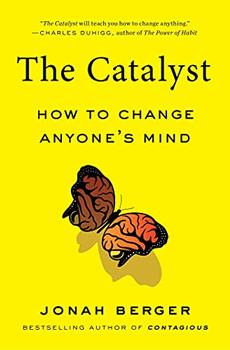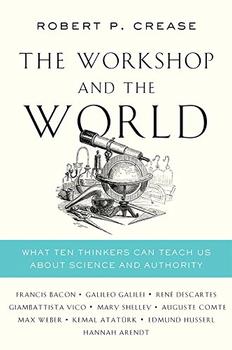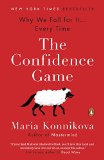Summary | Excerpt | Reviews | Beyond the book | Read-Alikes | Genres & Themes | Author Bio

Critics' Opinion:
Readers' Opinion:
First Published:
Mar 2020, 288 pages
Paperback:
Feb 2022, 288 pages
 Book Reviewed by:
Book Reviewed by:
Ian Muehlenhaus
Buy This Book
Jonah Berger's The Catalyst couldn't be more timely. If there was one book to read as the world is forced to quickly change a century of social behavior to weather a pandemic, this one should be given solid consideration. Why? It explains how to persuade people to change their behavior even when they are paralyzed by fear or what they see as insurmountable hurdles.
Berger is a Professor at the Wharton School of the University of Pennsylvania specializing in persuasion, viral media and cultural diffusion. Through his research, he has identified five methods of removing barriers to change that, when enacted congruently, can be used to convince people to do almost anything. Though this may sound manipulative, it's not necessarily so. In fact, none of these techniques push or trick people into doing what you want them to do. Rather, Berger promotes empathetic techniques to help people make difficult decisions. He argues that by understanding five principles, one can persuade anyone to do something.
Reactance is what happens when you try to push someone into doing something. Berger points out that it is our natural tendency to want to cajole or force a person into doing what we want. The problem? It never works, because no one likes being told what to do. The irony is that the less you push, the more you can use "tactful empathy" (i.e., listening to why people are not doing what you want them to do) and build trust. Once trust is established, often all one needs to do is ask for the other to cooperate. Berger provides evidence by discussing the techniques of an FBI agent with exceptional negotiating skills who could get anyone to walk out and surrender.
Endowment (i.e., status quo) is another major issue. This is why people stick to mediocre situations or routines. Sticking with how things are can be more damaging and hurtful than making a big change, both for organizations and in one's personal life. He uses the metaphor of a sprained ankle (endowment) versus a broken one (change). People will suffer through a sprained ankle rather than treating it, assuming it will get better on its own, but if it's believed to be broken, they'll head straight to the doctor, resulting in less pain and more functionality over time. By showing those suffering as a result of endowment what they're losing by sticking with their same old way of doing things, you can motivate them to change.
Berger argues that you need to meet people where they are: logically, emotionally and mentally. He calls this principle distance. He suggests imagining people's beliefs as a football field. You need to be in the same part of the field to have a persuasive impact and nudge a person out of their comfort zone. If you want to successfully persuade them, you must understand why they currently believe what they do. What motivates them? Find common ground on other topics with similar motivation. Shrinking the distance between two positions is crucial to facilitating change.
Uncertainty is one of the largest hurdles to overcome. When people are not sure what will happen, or what to do, they tend to freeze. Uncertainty leads to inaction. To successfully persuade, you need to provide an out—the option to go back to an old way of thinking or doing something if the new way does not work. A prime example of this in commerce is the concept of "no hassle, free returns." Many people were very reluctant to buy items online originally. Once the potential risk, or uncertainty, was mitigated by return policies, they were willing to try it.
Finally, the fifth principle of persuasion is corroborating evidence. Notice that this isn't the first or the only method, which is often why scientists fail to convince the public effectively. However, corroborating evidence, when coming from multiple sources and particularly from those that the person respects, can be a powerful motivator.
Berger's book is a quick and fun read. You'll likely begin relating these techniques to your own life and circumstances. I found myself thinking about how to apply these persuasive tactics in my workplace to help convince my boss that we are falling behind the competition due to endowment. I even convinced my skeptical spouse to begrudgingly admit that Bob Dylan might be a pretty good vocalist. (We couldn't come to a consensus on Yoko Ono, however.)
Though similar in spirit and energetic writing style, Berger is not a clone of Malcolm Gladwell. The Catalyst suffers from the fact that it was written by a business professor, not a science journalist. It is lively and full of anecdotes, but lacks the depth of research and interviews that Gladwell typically brings to a book. Berger's arguments are marred by his reliance on well-chosen but anecdotal evidence. It's obvious he has learned the power of storytelling when making an argument, as every chapter includes several stories or examples of the technique in action. There is research in the book; this is not a total fluff piece. But a lot of it is based on armchair evidence you may have read in layperson nonfiction elsewhere already (e.g., by including the word "because" in a request, you are more likely to get people to acquiesce).
Scholarly rigor aside, The Catalyst is a book that will stick with you. Its concepts are difficult to shake and continually pertinent in everyday life, and it will likely enlighten how you approach arguments and discussions in a positive way. And to end where we began, if there is a silver lining to the current COVID-19 pandemic, it is the hope that it acts as an eye-opening catalyst, helping us get past previous barriers to improving society.
![]() This review was originally published in The BookBrowse Review in April 2020, and has been updated for the
February 2022 edition.
Click here to go to this issue.
This review was originally published in The BookBrowse Review in April 2020, and has been updated for the
February 2022 edition.
Click here to go to this issue.

If you liked The Catalyst, try these:

by Robert P. Crease
Published 2019
A fascinating look at key thinkers throughout history who have shaped public perception of science and the role of authority.

by Maria Konnikova
Published 2017
An intriguing investigation into what makes a con artist, and why we continue to be duped by them.





The Funeral Cryer by Wenyan Lu
Debut novelist Wenyan Lu brings us this witty yet profound story about one woman's midlife reawakening in contemporary rural China.
Your guide toexceptional books
BookBrowse seeks out and recommends the best in contemporary fiction and nonfiction—books that not only engage and entertain but also deepen our understanding of ourselves and the world around us.